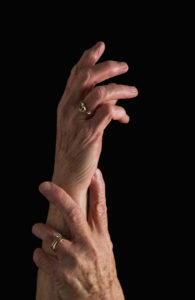Improve Schizophrenia Symptoms with Yoga
By John M. de Castro, Ph.D.
“Using a combination of asanas (poses and stretches) and pranayama (systematic breathing practices), yoga can help you achieve a state of focus and relaxation that makes it easier to shine a lens on the nature of your thoughts. Understanding this nature and how it affects and distorts your reality is a key part of treating schizophrenia and helping you realize just how much it’s affecting your life and the relationships that you have with others.” – Tyler Dabel
Schizophrenia is the most common form of psychosis. Its effects about 1% of the population worldwide. It appears to be highly heritable and involves changes in the brain. It is characterized by both positive and negative symptoms. Positive symptoms include hallucinations; seeing and, in some cases, feeling, smelling or tasting things that aren’t there, or delusions; unshakable beliefs that, when examined rationally, are obviously untrue. Negative symptoms include a reduced ability to function normally, neglect of personal hygiene, lack of emotion, blank facial expressions, speaking in a monotone, loss of interest in everyday activities, social withdrawal, an inability to experience pleasure, and a lack of insight into their symptoms. The symptoms of schizophrenia usually do not appear until late adolescence or early adulthood.
Schizophrenia is very difficult to treat with psychotherapy and is usually treated with antipsychotic drugs. These drugs, however, are not always effective, sometimes lose effectiveness, and can have some difficult side effects. Mindfulness training has been shown to be beneficial for a variety of mental health problems, including psychosis. Mindfulness has also been shown to associated with lower symptom severity of schizophrenia. Yoga is a mindfulness practice that has been shown to improve the symptoms of schizophrenia. Hence it is important to further investigate the effectiveness of yoga practice for the treatment of schizophrenia.
In today’s Research News article “Add-on Yoga Therapy for Social Cognition in Schizophrenia: A Pilot Study.” (See summary below or view the full text of the study at: https://www.ncbi.nlm.nih.gov/pmc/articles/PMC6134743/ ), Govindaraj and colleagues performed an uncontrolled pilot study of yoga practice for the treatment of schizophrenia. They recruited schizophrenia patients who were stabilized on antipsychotic medications and provided for them 20, 1-hour, yoga sessions over 6 weeks. The practice consisted of poses, breathing practices, and chanting. They were measured before and after treatment for positive and negative symptoms of schizophrenia, social disability, and social cognition.
They found that after the 6 weeks of yoga practice there were significant reductions in both positive and negative symptoms of schizophrenia and in social disability, and significant increases in social cognition. This was an uncontrolled pilot study, so conclusions must be tempered, But the results are encouraging and support the potential application of yoga practice for the treatment of the symptoms of schizophrenia. They provide the support needed to launch a large randomized controlled trial to firmly establish whether yoga practice may be a beneficial add-on treatment for schizophrenia.
So, improve schizophrenia symptoms with yoga.
“yoga has significant benefits to those diagnosed with schizophrenia. The effects of yoga therapy are multifaceted, including reduction of psychotic symptoms and depression, improving cognition, increasing quality of life, and producing neurobiological changes, such as increased oxytocin levels.” – Namita Nayyar
CMCS – Center for Mindfulness and Contemplative Studies
This and other Contemplative Studies posts are also available on Google+ https://plus.google.com/106784388191201299496/posts and on Twitter @MindfulResearch
Study Summary
Govindaraj, R., Naik, S., Manjunath, N. K., Mehta, U. M., Gangadhar, B. N., & Varambally, S. (2018). Add-on Yoga Therapy for Social Cognition in Schizophrenia: A Pilot Study. International journal of yoga, 11(3), 242-244.
Abstract
Background:
Yoga as a mind–body therapy is useful in lifestyle-related disorders including neuropsychiatric disorders. In schizophrenia patients, yoga has been shown to significantly improve negative symptoms, functioning, and plasma oxytocin level.
Aim:
The aim of the study was to study the effect of add-on yoga therapy on social cognition in schizophrenia patients.
Materials and Methods:
In a single pre-post, study design, 15 schizophrenia patients stabilized on antipsychotic medication for 6 weeks were assessed for social cognition (theory of mind, facial emotion recognition, and social perception [SP]) and clinical symptoms (negative and positive symptoms and social disability) before and after twenty sessions of add-on yoga therapy.
Results:
There was a significant improvement in the social cognition composite score after 20 sessions of yoga (t[13] = −5.37, P ≤ 0.001). Clinical symptoms also reduced significantly after twenty sessions of yoga.
Conclusion:
Results are promising to integrate yoga in clinical practice, if proven in well-controlled clinical trials.
https://www.ncbi.nlm.nih.gov/pmc/articles/PMC6134743/






